The world is changing rapidly and the skills that we need to succeed in today's economy are constantly evolving. In order to stay ahead of the curve, it's more important than ever to be a lifelong learner through an online learning platform.
Some people think that online learning is only for young people looking for jobs. But it is not true. Online learning can be beneficial for people of all ages and professions:
- Employed people: Stay up-to-date on industry trends, advance careers and expand knowledge
- Freelancers: Learn skills relevant to their work (e.g., SEO, content marketing)
- High school or college students: Supplement classroom education, access specialized courses, or earn college credit or degree
- Parents: Acquire skills in early childhood education or parenting
- Retired people: Stay active, learn new skills, and meet new people
As a lifelong learner, I have searched for effective platforms to enhance my career growth and improve my skills. Through trial and error, I have discovered hidden gems that have revolutionized my learning experience. Some of these platforms are not widely promoted or heard of, but they have proven to be invaluable sources of knowledge.
This blog post will share 12 of the best online learning platforms that could help you in your lifelong learning journey. Before we get to the list, let's first discuss the criteria to evaluate these platforms. If you're also interested in creating your own online courses, it's essential to have the right eLearning authoring tools. Check out this comprehensive guide on eLearning authoring tools to get started.
Criteria For Evaluating Online Learning Platforms
Signing up for an online educational resource without proper evaluation can lead to disappointment. It's crucial to weigh the following factors to ensure you get the value you need. Here's a list of factors that I considered when identifying the best online learning platforms.
| Critera | Questions to Ask |
|---|---|
| Course offerings | What courses are available? What are the topics covered? Are the courses relevant to my interests? What is the level of difficulty of the courses? Are the courses offered relevant to the current job market? |
| Qualified instructors | Who are the instructors? Do they have experience in the field? Are the instructors engaging and enthusiastic? |
| Learning resources | Are there additional resources available, like quizzes and forums? Are the resources helpful and informative? Are the resources updated regularly? |
| Cost | How much does it cost to access the courses? Are they worth the investment? Are there additional fees or hidden costs associated with the course? |
| Customer support | Is there a customer support team available to help? How quickly does the customer support team respond to questions? |
| Reputation | What is the reputation of the online learning platform? Is it well-respected? What are the reviews of the online learning platform? |
| Flexibility | Can I learn at my own pace? Can I access the courses from anywhere? Can I pause and resume courses at my convenience? |
| Certifications | Are certificates of completion available? Are the certificates recognized by employers? What are the benefits of earning a certificate of completion? |
| Learning outcomes | Are there courses available that teach practical skills that can be applied to real-world situations? Are there opportunities for feedback and interaction with instructors or other learners? Will this platform satisfy my learning goals? |
Before jumping into an online learning platform, take a moment to reflect on your needs and goals. It's crucial to ensure that the platform you choose is a good fit for you to maximize your learning experience. So, ask yourself the right questions.
1. Skill Success
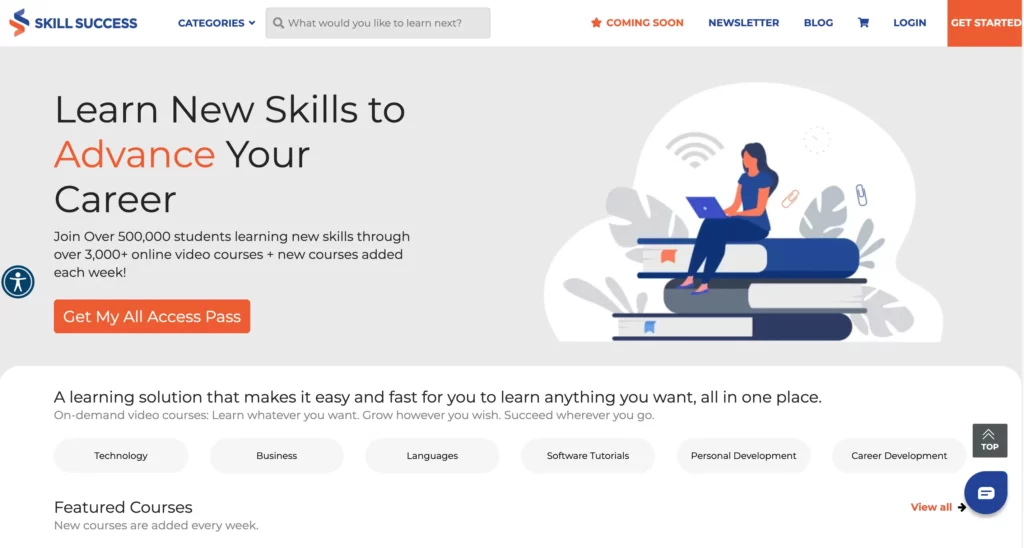
Skill Success offers a wide range of courses with over 4,000 video courses available. It collaborates with companies and small businesses, ensuring its courses address real-world needs. This makes learning more effective for individuals and teams.
Skill Success' unique value proposition lies in its diverse course catalog, affordable subscription model, and flexible learning options. With a wide range of subjects and skills covered, learners have the opportunity to explore their interests and acquire new knowledge. Skill Success All Access Pass, subscription-based pricing, makes it accessible and cost-effective, allowing learners to access unlimited courses without additional charges. The platform's flexibility enables individuals to learn at their own pace and convenience, fitting education into their busy schedules.
I was impressed with the platform's mission to "transform lives through daily education" and decided to give it a try. The courses are well-designed and easy to follow, and the instructors are knowledgeable and engaging. I have already learned a lot from the courses I have taken, and I am confident that I will continue to learn and grow as I continue to use the platform.
Pros:
- Downloadable certificates
- Lets you learn without disrupting your schedule
- Courses are available on mobile and desktop
- Exceptional customer support team
- 10-day money-back guarantee
- Offers value for your money
- Zero learning curve
- No hidden costs
Cons:
- No mobile app
- No free trial available
- Course materials are only offered in English
- No student-instructor interaction
- No degree programs
Pricing:
- All Access Pass: $5-29 / month
- Lifetime Membership: $50-$228 / year
- One-time payment: $99-$299
- Single Course: $29
Who is this online learning platform for?
Skill Success' rates and skill-based courses appeal to a broad range of audiences. But I highly recommend this platform for busy professionals who want to develop their skills without worrying about time constraints. Freelancers and career builders will also find purchasing individual courses particularly useful. It's also an excellent choice for those looking for a new hobby or activity to do during their free time.
2. Coursera
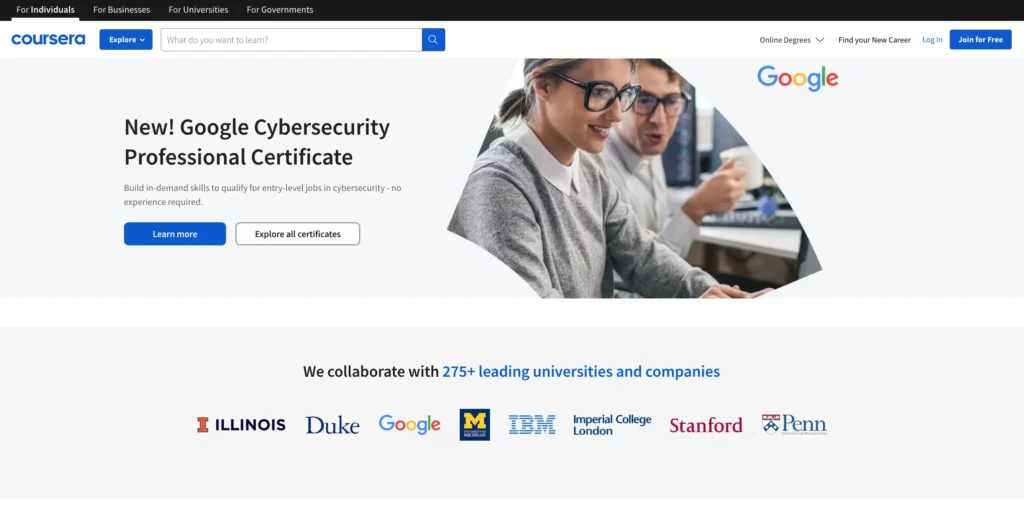
Coursera is a widely recognized online learning platform that offers a vast array of courses and programs from top universities and institutions around the world. It courses across various subjects, including business, technology, data science, arts, humanities, and more.
Coursera works with big companies like Google, IBM, Microsoft, and PwC. This means that the courses they offer are very good and are recognized by employers. Coursera also lets you learn at your own pace, so you can fit it into your busy schedule. This makes Coursera a great choice for lifelong learners like us.
I've always wanted to study at a reputable university in the United States, but I couldn't because of the distance and cost. Fortunately, Coursera came to the rescue, offering top-notch online degrees and certifications. One of the things I love most about Coursera is the community. There are forums where you can ask questions and get help from other students. This is a great way to learn from others and to get support when you're struggling with a concept.
Pros:
- Specialized classes and degrees
- Collaboration with universities and organizations
- Mobile app access
- Taught by industry experts
- Academic style of learning
- 7-day free trial
- Free courses available
- 14-day refund policy
- Offers financial aid
- Offline learning
Cons:
- Unclear pricing
- Limited course subjects
- Deadlines for assessments
- Prior knowledge required in some courses
- You need to pay for your certificate for free video lessons
Pricing:
- Specializations & Professional Certificates: $39.99 / month
- Single course programs: $49-$79
- Guided Projects: starts at $9.99
- Coursera Plus: $399/year
- Degrees: up to $50,000
Who is this online learning platform for?
Coursera provides endorsed certifications and university degrees, making it an ideal option for college students seeking budget-friendly diplomas. It's also a great choice for mid-career professionals who need to strengthen their resumes without compromising their work schedules. Additionally, Coursera appeals to lifelong learners looking for higher education opportunities.
3. Skillshare
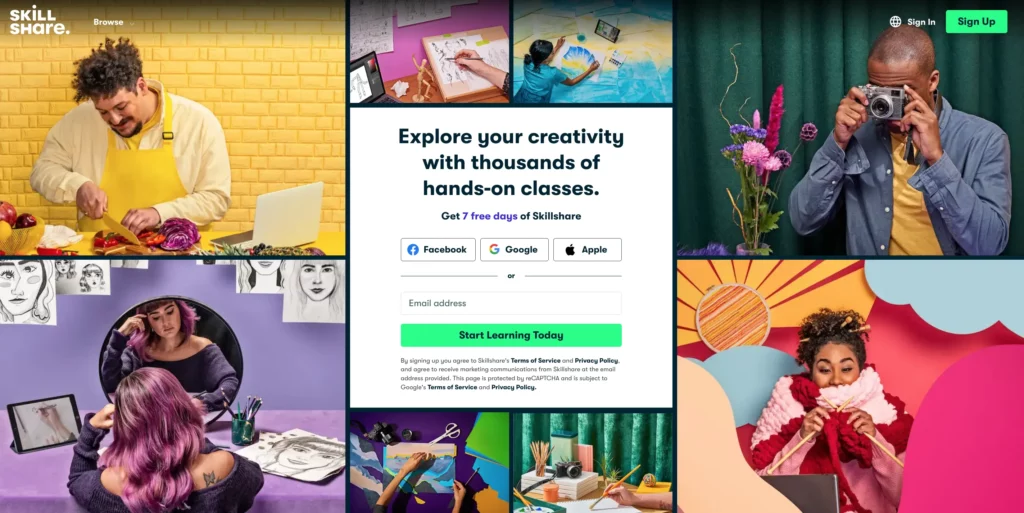
Skillshare provides a platform where learners can access thousands of classes across various disciplines, including art, design, photography, writing, marketing, and more. The platform is designed to empower individuals to learn new skills, explore their passions, and unlock their creative potential.
Skillshare's standout feature is its accessibility and affordability. With a subscription model, learners can access unlimited high-quality courses for a monthly or annual fee. This pricing structure ensures that Skillshare is accessible to learners of all budgets.
One of the things I like best about Skillshare is that the instructors are really talented and passionate about what they teach. They make learning fun and easy to understand. And they're always available to answer questions.
Pros:
- Inexpensive
- 1-Month of a free trial
- Highly engaged community
- A huge pool of creative experts
- Free trial for premium plans
- Mobile app access
- Offline access
- Promotes collaboration, community, and feedback
Cons:
- Only four categories of courses: arts, technology, business, and lifestyle
- No certificates issued for completed courses
- Annual membership only
Pricing:
- 14-day free trial
- Starter plan (for 2-9 learners): $165/year
- Team Package: $159 per user/year
- Monthly subscription: $19
- Annual subscription: $99
Who is this online learning platform for?
I suggest SkillShare to any marketers and entrepreneurs concerned about the cost and time commitment of on-campus learning. The platform has lessons that can help them gain skills that can be valuable for their business. And it's also an excellent learning environment for freelancers and small businesses to develop team career development virtually.

4. Udacity
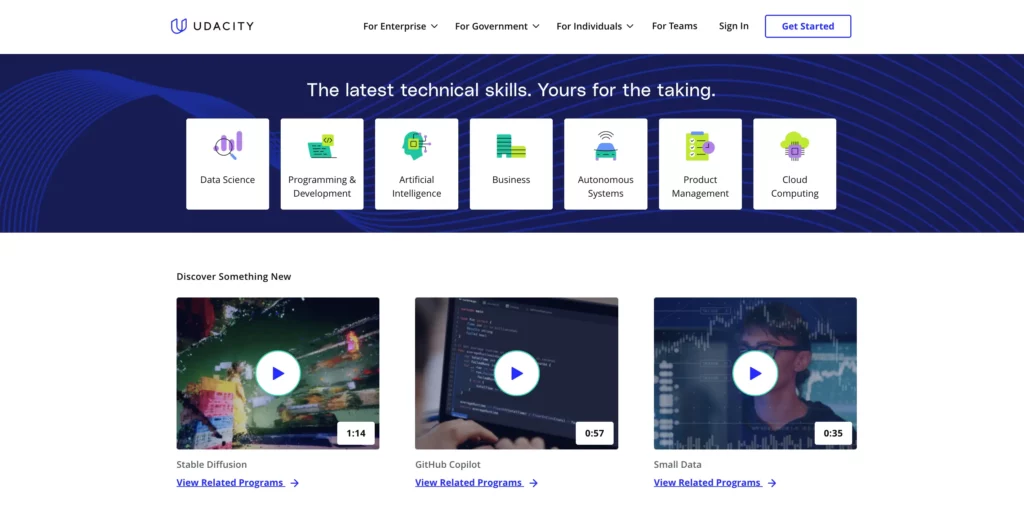
Udacity focuses on technology and industry-relevant subjects. Partnering with top companies, it offers cutting-edge content and real-world projects to empower individuals to acquire in-demand skills and staying ahead in today's job market.
Udacity's unique feature is its hands-on learning and industry collaboration. Their nanodegree programs offer comprehensive and project-based courses tailored to prepare learners for specific careers. Developed with industry experts and companies, the curriculum is up-to-date and aligned with industry needs.
One of the things I like most about Udacity is the ability to learn from experts in the field. The instructors come from Fortune 500 and Global 2000 companies. They are passionate about teaching and are committed to helping you succeed. It also offers personalized feedback on your project submissions. This feedback can help you identify areas where you need to improve and can give you the guidance you need to succeed.
Pros:
- An intuitive user interface with a low learning curve
- Provides educational financing assistance
- Employers recognize course certifications
- Has up to 200 free courses
- 14-Day refund policy
- 24/7 mentor support
Cons:
- No mobile app available
- English only
- Expensive
- Limited course variety
Pricing:
- Monthly pay as you go: $399/month (pay until you earn your certificate)
- All-access: $275/month
Who is this online learning platform for?
Udacity is an excellent platform for individuals interested in starting or transitioning into a career in the tech industry. Their focus on technology courses makes it an invaluable resource. The platform also provides career development courses for job seekers and fresh graduates to prepare for interviews and polish their resumes.
5. MasterClass
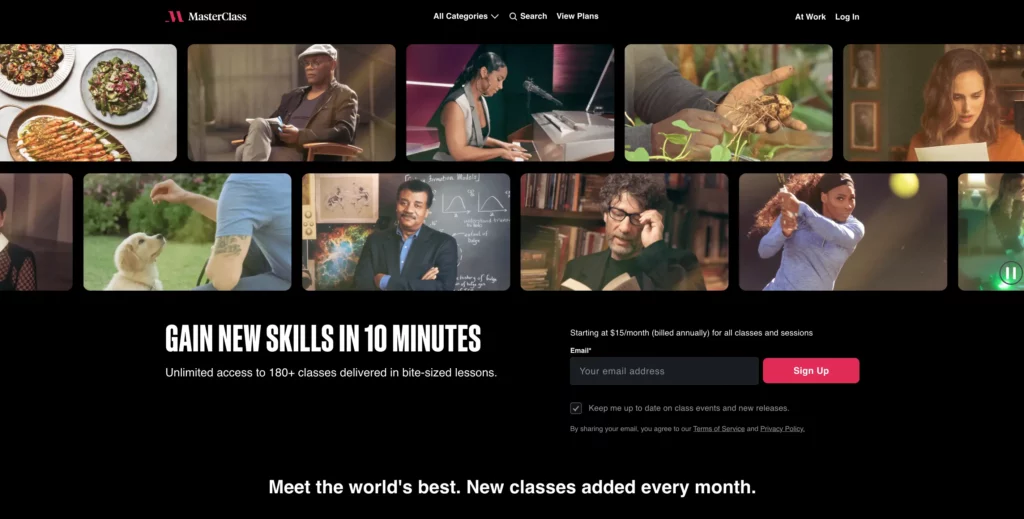
MasterClass offers a unique and immersive learning experience. It provides access to world-renowned instructors who are masters in their respective fields. It brings together experts, including actors, authors, athletes, and musicians. These accomplished individuals share their knowledge and insights, offering learners a unique opportunity to learn from the best.
What sets MasterClass apart is its emphasis on storytelling and practical learning. Lessons are designed not only to teach technical skills but also to provide a glimpse into the instructor's creative process and mindset. Learners can gain a deeper understanding of the craft and learn valuable techniques and strategies to apply in their own pursuits.
I'm captivated by MasterClass Live, a new feature that offers interactive classes taught by favorite instructors. These 60-minute sessions cover diverse topics like cooking, writing, and acting. Engage with fellow students in the live chat and network with instructors after class. It's an exciting opportunity to learn and connect in real-time.
Pros:
- Mobile app available
- Easy-to-use mobile app
- 30-day refund policy
- High-quality production
- Learn at your own pace
- Diverse range of topics
- Opportunity to connect with other learners
Cons:
- No single classes provided
- No free subscription
- Up to 6 devices under one account
- No certificates or degrees after completing their classes
- Not designed for those seeking a structured, comprehensive learning experience
Pricing:
- Individual membership: $180/year
- Duo membership: $240/year
- Family membership: $276/year
Who is this online learning platform for?
MasterClass is an excellent learning platform for creative professionals who want to learn from the world's top experts. Additionally, the platform's celebrity instructors make it an ideal choice for fans who want to learn from their idols. Finally, I recommend lifelong learners who enjoy watching documentaries from various disciplines to get a subscription here.
6. Udemy
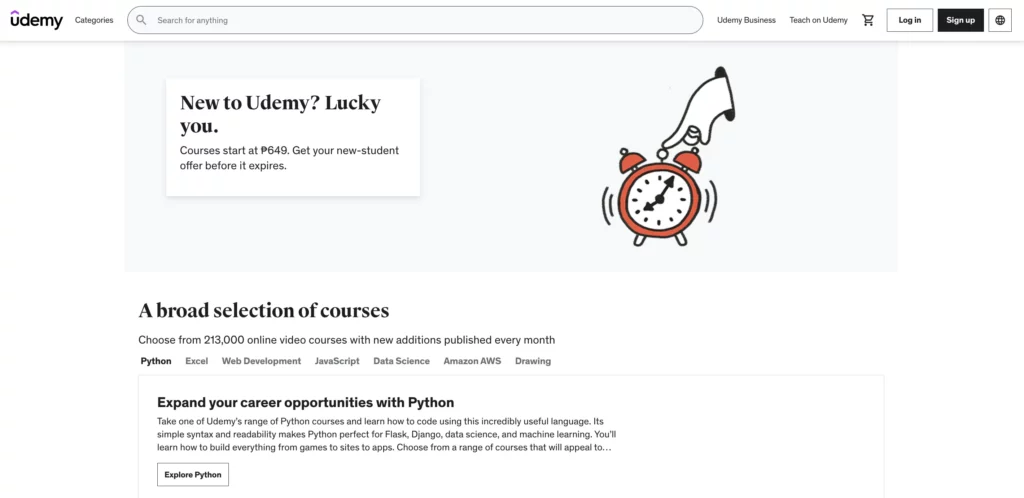
Udemy is another popular online learning platform that offers a wide range of courses on various subjects. It serves as a marketplace where instructors from around the world can create and sell their courses to learners of all backgrounds.
Udemy's best feature is its wide variety of courses. With over 155,000 courses, there's something for everyone, no matter what your interests or learning goals are. Whether you're looking to learn a new skill, advance your career, or simply expand your knowledge, Udemy has a course for you.
What I like about Udemy is the affordability of the courses. Most courses are priced between $10 and $20, which is very reasonable. There are also often sales and discounts available, which can make the courses even more affordable.
Pros:
- Learning materials available
- With up to 600 free courses
- 30-Day money-back guarantee
- Affordable pricing with frequent discounts and promotions
- Certificate of completion for paid classes
- Courses are accessible on-demand and at the learner's own pace
Cons:
- Course quality can be inconsistent
- No official recognition from schools or universities
- Limited interaction with instructors and other students
Pricing:
- Individual course: $12.99 - $199.99
- Udemy Plus: $19.99/month or $179.99/year (access to over 100,000 courses)
- Udemy Business (Teams): $360 per user/year plus taxes
Who is this online learning platform for?
I recommend Udemy for individuals who are job searchers or startup founders looking to enhance both their soft and technical skills. Instead of paying for an entire subscription plan, users can purchase individual courses for specific needs. So it's an affordable and convenient option if you're on a tight budget or wanting to take classes as needed.
7. LinkedIn Learning
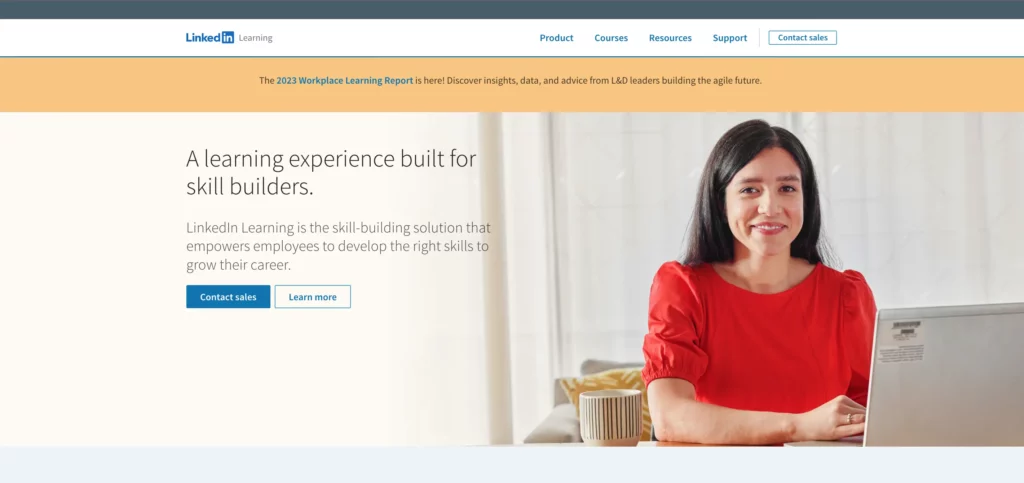
LinkedIn Learning aims to empower learners to build skills that advance their careers and help organizations grow and retain talent. It offers role-based content and skills tailored to individuals' career paths, providing a personalized learning experience.
One standout feature of LinkedIn Learning is the seamless integration with your LinkedIn profile. After completing a course, you can showcase your new skills and certifications on your LinkedIn profile. This demonstrates your commitment to continuous learning to potential employers and colleagues.
This platform has become my go-to resource for expanding my skill set and staying up-to-date with industry trends. It has the ability to curate personalized learning paths based on my job title, skills, and interests. This feature has saved me valuable time by delivering relevant and targeted courses that align perfectly with my learning goals.
Pros:
- Multiple languages
- Personalized recommendations
- 30-Day refund for single courses
- Learn on the go with the mobile app
- Video-based lectures include captions
- 1-month free access to 20,000+ courses
- Downloadable courses for offline learning
Cons:
- Limited scope of courses
- Narrow focus on in-depth technical training
- Employers may not recognize or accept certificates
- No refund policy for a premium or monthly subscriptions
Pricing:
- Annual: $239.99 / year (Includes 1-month free trial)
- Monthly: 39.99 / month (Includes 1-month free trial)
- Individual courses: $20-$40 plus tax
- Teams of 2-20: $379.99 per user/year
Who is this online learning platform for?
Without a doubt, I recommend LinkedIn Learning to career builders and job seekers who want to enhance their career prospects. Entrepreneurs can also benefit from the platform by developing applicable skills for their businesses.

8. Khan Academy
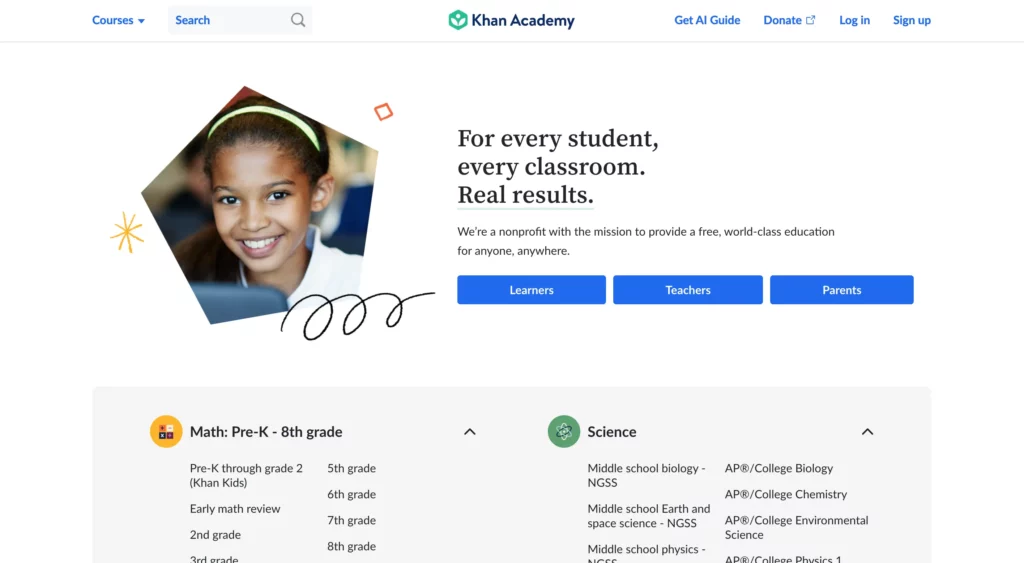
Khan Academy is a non-profit educational organization that offers free, world-class education for anyone, anywhere. Its library of content includes over 10,000 videos covering a wide range of subjects, from math and science to history and literature. It also offers tools for teachers, including lesson plans and assessments.
Khan Academy is one of the best because it provides free, high-quality education to anyone, regardless of their background or circumstances. The organization's mission is to "provide a free, world-class education for anyone, anywhere." Khan Academy believes that everyone deserves access to quality education, and it is working to make that a reality.
I am impressed with the impact of Khan Academy. They rely on the support of generous donors to continue offering free education to millions around the world. Knowing that Khan Academy is accessible to anyone and offers such a comprehensive and high-quality education is truly remarkable.
Pros:
- Free courses
- Gamification elements
- Available in multiple languages
- Personalized learning approach
- No need to register for an account
Cons:
- Don't offer certificates
- No degrees offered
- Not ideal for learners seeking in-depth or advanced knowledge on a specific subject
Pricing:
- Free for anyone, anywhere.
- You can donate $12+ to support Khan Academy
Who is this online learning platform for?
Khan Academy helps students, teachers, and lifelong learners. It offers courses on math, science, humanities, test preparation, and more. Khan Academy's courses are tailored to different learning styles and allow you to learn at your own pace.
9. FutureLearn
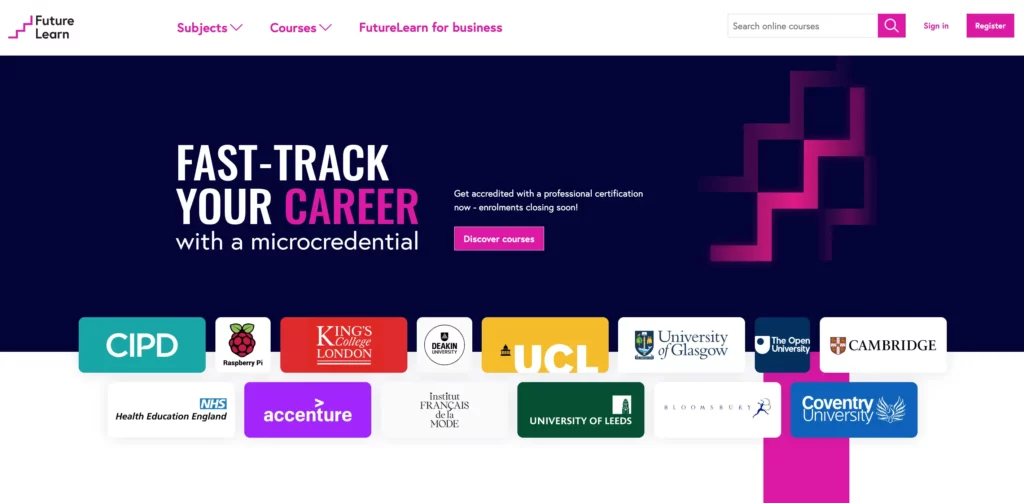
FutureLearn provides access to top universities and organizations from around the world. The platform offers a range of learning options to cater to different preferences and needs. This includes short courses that span 4-8 weeks, expert tracks for more in-depth learning experiences, and microcredentials that offer quick and focused knowledge bites.
FutureLearn works with important organizations like the British Council and the British Museum to make sure that the education they provide is high-quality and relevant to the world today. They also make learning more fun and inclusive by adding features like badges, leaderboards, and captions in multiple languages.
One thing that truly captivates me is the opportunity to earn bachelor's, master's, and postgraduate degrees in various subjects like business, art, finance, education, and sustainable development. The best part? You can achieve these qualifications from the comfort of your own home.
Pros:
- Certificates and other credentials issued by top universities
- Organizations recognize some certificates
- Social and interactive learning approach
- 28 free certification courses
- Free subscription available
Cons:
- Requires you to pay for most certificates if not enrolled
- No mobile app for offline learning
- Limited course catalog
Pricing:
- Certificates: $39-$400
- Unlimited Plan: $269.99 / year
- Micro-credential programs and online degrees: starts at $600
Who is this online learning platform for?
FutureLearn is ideal for those who learn best through collaborative discussions. Additionally, it’s a great choice for students who need degrees in a short amount of time.
10. PluralSight
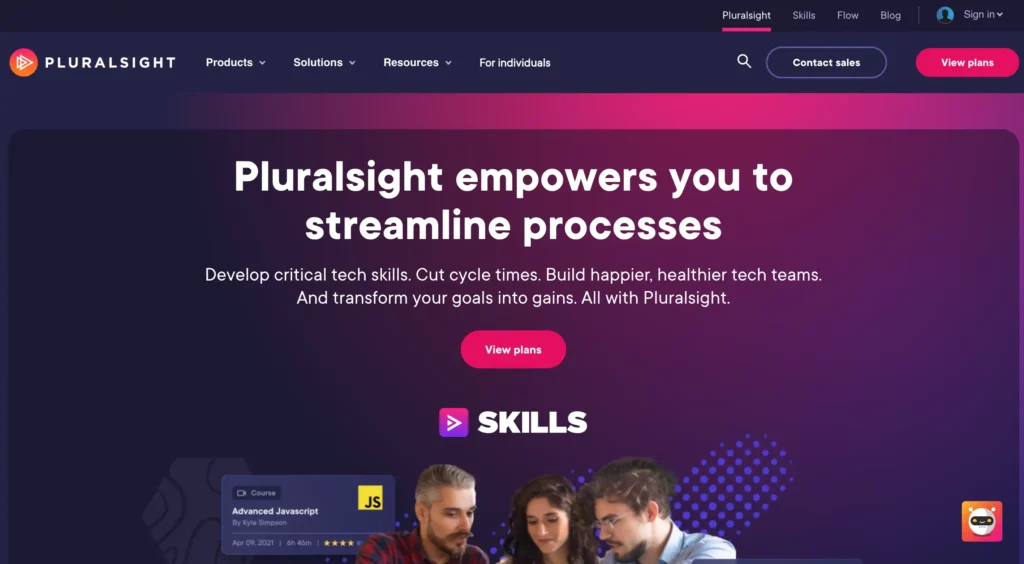
Pluralsight offers courses in various disciplines, with a particular focus on tech skills. With over 7,000 courses in its catalog, this platform covers a wide range of topics, including programming, web development, business, and creative skills.
One of the key features of Pluralsight is its emphasis on keeping individuals and teams up to date with the latest technologies and industry trends. By offering specific and targeted training, it enables organizations to ensure that their team members have the necessary skills and knowledge in specific technologies. This helps businesses stay ahead and be more competitive in their respective fields.
I believe that Pluralsight is one of the best online learning platforms for technology professionals. It will keep you in the loop with the latest technology trends and developments. It's like having a personal mentor guiding you through the ever-evolving tech landscape.
Pros:
- Free account with access to over 200 free skill assessments
- Offline and mobile downloads available
- 10-Day free access to individual plans
- 14-Day free trial period on team plan
- Industry-recognized certifications
Cons:
- Subscription plans can be expensive
- Limited engagement and interaction
- Limited range of topics
- No free courses
Pricing:
- Standard individual plans: $29/month or $299/year
- Premium individual plans: $45/month or $449/year
- Business starter plan: $399/year
- Business professional plan: $579/year
- Business enterprise: $779/year
Who is this online learning platform for?
I recommend Pluralsight to anyone who is interested in learning new tech-related skills. It offers a wide range of courses on a variety of tech topics, from web development to data science. Pluralsight is also a great resource for businesses that are looking to upskill their employees or stay ahead of the competition in the tech industry. It offers a variety of pricing options to fit the needs of businesses of all sizes.

11. edX
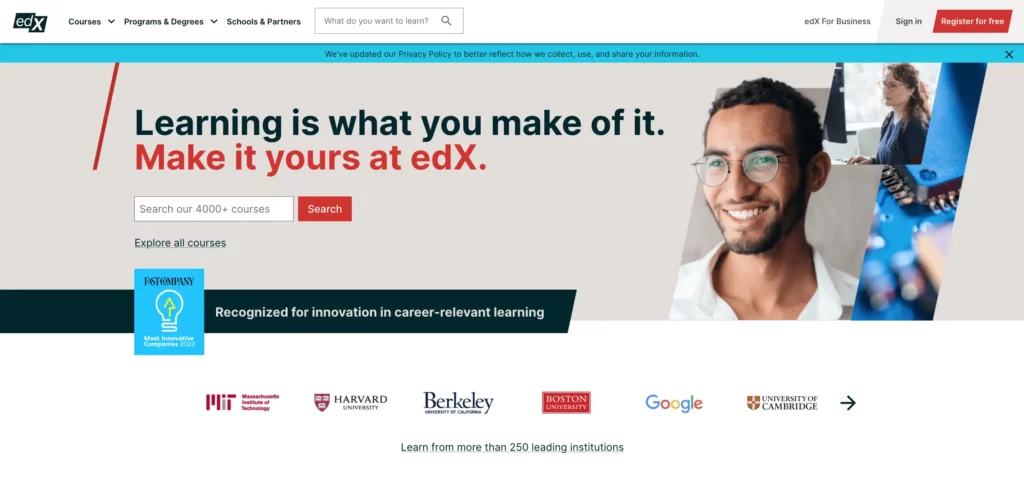
edX, like Coursera and FutureLearn, partners with top institutions to offer high-quality courses. As a non-profit organization founded by Harvard and MIT, edX focuses on making education accessible and empowering individuals through online learning. It ensures that its courses meet the highest standards of quality and excellence.
edX has a rigorous course review process. This ensures that the content is current, relevant, and meets industry standards. This commitment to quality ensures that learners have access to high-quality courses that are up-to-date and aligned with industry expectations.
For me, one impressive aspect of edX is its initiative to providing financial aid to qualifying learners. This makes education more accessible to people from diverse backgrounds, regardless of their financial circumstances. It showcases edX's dedication to inclusivity and ensuring that education is available to everyone.
Pros:
- Offers a variety of languages
- Course certificates are verified
- Pay later learning opportunities
- Financial assistance is available
- Money-back guarantee for up to 14 days
- User-friendly interface with a personalized learning experience
- Flexible learning schedule
- Partnered with prestigious organizations, companies, and institutions
Cons:
- Only specialized in higher education
- May require some background knowledge of some courses
Pricing:
- Subscription plan: $349 per user/year
- Individual courses: $50-$300
- Master's degree: $10,000-$25,000
- MicroMasters: $600-$1,500
- MicroBachelors program: $500-$1,500
- Professional certificates: $150-$1,000
Who is this online learning platform for?
I recommend this to lifelong learners who are interested in exploring graduate-level education but are busy with work. Although they offer flexible learning, the courses are equivalent to college subjects.
12. Alison
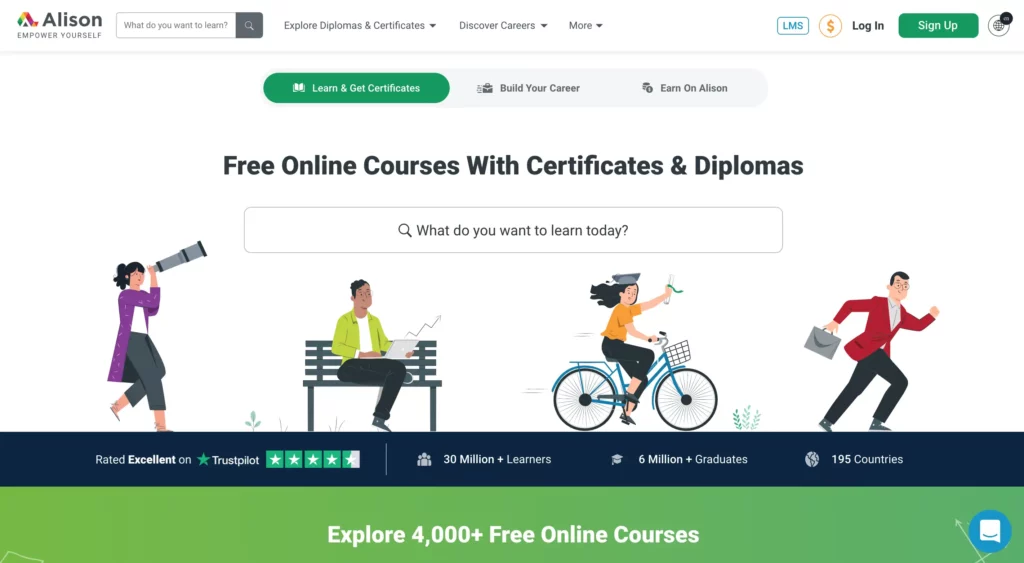
Last but not least, there is a platform that will help you gain knowledge and acquire new skills without breaking the bank. Alison is a free online education platform that offers a wide range of courses for learners in various domains, including school, work, and personal development.
It has an incredible offering of free courses across diverse subjects like business, IT, design, health, language, and more. I was amazed by the vast catalog of courses available at no cost. Whether you wanted to enhance your business skills or delve into the world of IT, Alison had it all.
I appreciate the free courses provided by Alison. It's important to note that while the courses are free, there may be fees for obtaining certificates or diplomas. Personally, I carefully considered my options and chose some courses for personal growth and knowledge, while others for formal recognition. The flexibility to choose what works best for me is what makes this platform truly exceptional.
Pros:
- User-friendly interface
- Free resume builder and mental wellness assessments
- Personality trait assessments
- Detailed guides for a comprehensive learning
- Premium accounts with exclusive monthly discounts
- Self-directed learning
- Skill-based courses
Cons:
- Ads can be distracting
- Some courses are not as in-depth as others
- Not all certifications are recognized by employers
Pricing:
- Premium account: $8.70 / month (access all courses with certificates)
- Certificates: $22.87-$40.30
- Diplomas: $70.80-$125.26
Who is this online learning platform for?
I highly recommend Alison to learners like me who have a busy schedule but still prioritize education for career development. It's also a fantastic platform, especially for individuals who may need more means to access traditional learning environments, as they offer free and affordable training programs.
Disclaimer: The pricing information may change over time. Please visit their websites for the most up-to-date information.
Comparison of the Top 5 Online Learning Platforms
As an individual seeking the perfect online learning platform, I understand the importance of comparing and assessing the top options available. To make an informed decision, I carefully evaluate the top 5 online learning platforms based on my development goals, preferences, and specific requirements. Here's a quick review:
| Platform Name | Strengths | Weaknesses | Recommended For |
|---|---|---|---|
| Skill Success |
- Affordable pricing for a wide range of courses - Self-paced learning with lifetime access to courses - User-friendly interface |
- No free trial - No degree programs from universities - No mobile app available |
- Career builders - Hobbyists - Freelancers - Entrepreneurs - Busy professionals - Lifelong learners |
| Coursera |
- Offers courses from top universities and institutions - Wide variety of classes, including many technical and skill-oriented topics - Many courses include interactive assignments, quizzes, and projects for hands-on learning |
- Can be more expensive than other platforms - Courses have a set start and end date; learning is not self-paced |
- College students - Mid-career professionals - Lifelong learners |
| Skillshare |
- Affordable pricing for a wide range of courses - Courses taught by experts - Strong emphasis on creativity and design |
- Quality of courses can be inconsistent - Limited courses on tech- nical subjects - No degree programs |
- Creatives - Marketers - Entrepreneurs - Freelancers |
| Udacity |
- Focus on tech - Industry partnerships - Opportunities for hands-on learning through projects and assignments |
- Courses can be expensive, particularly if you want to earn a certificate or degree - Not enough selection of courses compared to other platforms |
- Fresh graduates - Tech professionals - Tech enthusiasts - Entrepreneurs - Career shfiters |
| Masterclass |
- Courses taught by high-profile experts - Emphasis on creative and lifestyle courses - High production value of course videos |
- Higher pricing compared to other platforms - Limited focus on technical or career-oriented skills |
- Creatives - Fans of celebrities - Lifelong learners |
Frequently Asked Questions
1. What are the advantages and disadvantages of online learning platforms compared to traditional classroom learning?
When it comes to online learning platforms versus traditional classroom learning, there are advantages and disadvantages to both. The main advantage of online learning is flexibility. You can learn at your own pace and on your own schedule, which is ideal if you're busy or have other priorities. However, one potential disadvantage is the lack of face-to-face interaction with instructors and other learners, which some students prefer.
2. How do online learning platforms ensure the courses' and instructors' quality and credibility?
Online learning platforms have strict quality control measures to ensure the credibility of their courses and instructors. They often partner with reputable educational institutions and subject matter experts to create and deliver high-quality content.
Platforms ensure that they carefully screen instructors to meet certain qualifications and standards. Many top online learning platforms also allow learners to provide feedback on their courses and instructors to maintain course quality.
3. How do online learning platforms assess student progress and provide feedback?
Online learning platforms use various methods to assess student progress and provide feedback. These include quizzes, assignments, projects, and exams. Sometimes, instructors also provide personalized feedback on assignments or projects.
Instructors can't guarantee one-on-one feedback due to the sheer number of students they have. But some platforms have various options to address this concern.
Some platforms have discussion sections within the lesson where learners can engage with instructors and fellow students. Others provide their Facebook group link, which allows students to access more information about the course material.
Learners can track their progress through a personalized dashboard and may receive certificates or badges upon course or program completion. These methods help learners stay motivated and engaged while providing valuable feedback to improve their skills and knowledge.
4. How do online learning platforms handle user data and privacy concerns?
Online learning platforms take user data and privacy concerns very seriously. They use advanced security measures to protect user data, such as encryption and multi-factor authentication.
Users have control over their own data and can manage their privacy settings to determine what information is shared. Apart from that, online learning platforms adhere to strict data privacy regulations and often have dedicated teams to ensure compliance.
5. Are online learning platforms accessible for learners with disabilities?
Yes, many online learning platforms strive to be accessible to learners with disabilities. They may offer features such as closed captioning, transcripts, and audio descriptions for videos, adjustable font sizes and colors, and keyboard shortcuts for those who cannot use a mouse.

Key Takeaways
Online learning is a great way to learn new skills, advance your career, or simply expand your knowledge. There are many great online learning platforms available, each with its own unique offerings. I'm confident that you'll find the perfect platform for your learning journey.
When choosing an online learning platform, it is important to consider your needs and goals. Some factors to consider include the cost of the platform, the types of courses offered, the quality of the content, and the flexibility of the platform.
We at Skill Success highly recommend our All Access Pass to anyone who wants to learn new skills and advance their career. With our All Access Pass, you get unlimited access to our vast library of courses, including courses with certificates. This is a great opportunity to learn new skills and grow your knowledge, so don't miss out!
Subscribe to Skill Success All Access Pass now!

